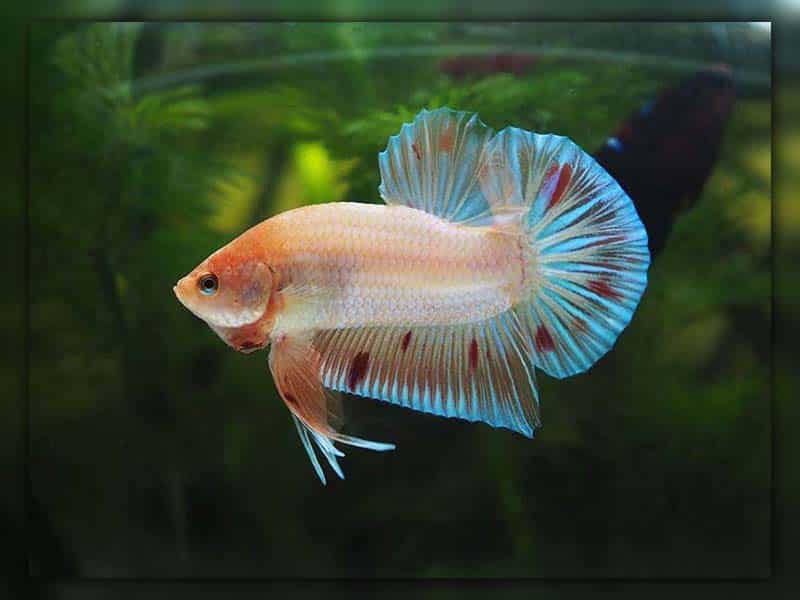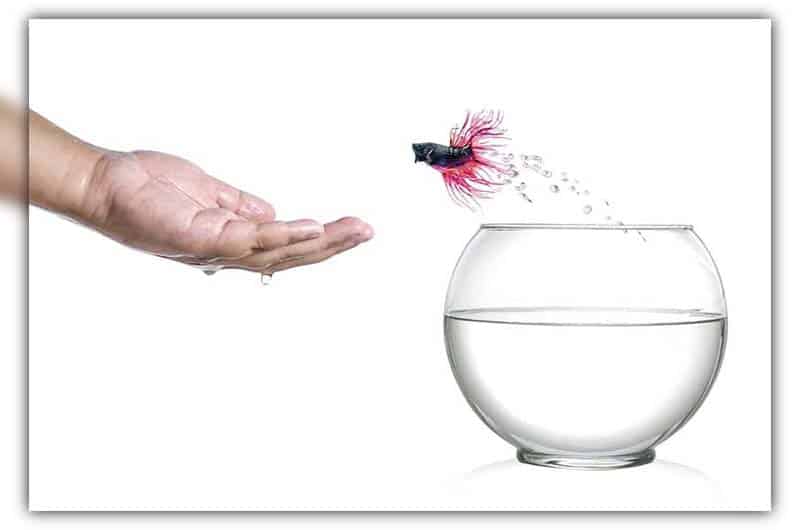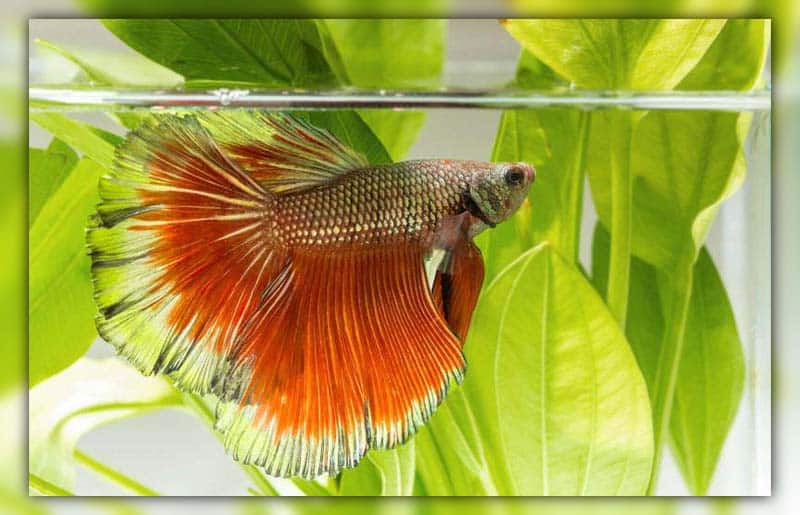Have you ever wondered are betta fish smart, and if yes, how to play with betta fish? Can we play with them like playing with our cats and dogs?
If you find yourself pondering these questions, you’re not alone. For many aquarium enthusiasts, understanding and engaging with their betta fish becomes a fulfilling and therapeutic journey.
If you’re looking to deepen your connection with your betta and explore the limits of their intelligence, you’re in the right place.
How Smart Are Betta Fish?
The Siamese fighting fish, more popularly known as the betta fish, is not just a visual delight with its vibrant colors and flowing fins. Beyond the surface, these aquatic beings showcase an astonishing intelligence and a plethora of behaviors that leave many intrigued.
Let’s embark on a journey to discover the remarkable facets of the betta fish.

1. Capable of Learning
Betta fish are intelligent creatures that can learn and remember in various contexts. They have demonstrated the ability to distinguish between colors and can identify whether a fish placed in their tank is real or a “dummy” fish. Bettas can learn to accomplish tasks or perform tricks that grow more intricate over time.
2. Easy To Train Betta
Betta fish are intelligent creatures that can be trained to perform a variety of tricks. Some of these tricks include jumping and swimming through small hoops.
3. Betta fish’s memory
Betta fish are known for their impressive memory capabilities. They can be trained to perform certain actions and can recognize and remember their owners’ faces and voices with regular interactions.
Bettas exhibit a keen sense of memory concerning their habitat and potential dangers. Male Bettas can differentiate between threatening and non-threatening presences in their domain and recall the location of such encounters.
4. Social Intelligence
Although male bettas are renowned for their aggressive territorial defense against other males, they exhibit various social behaviors that underscore their intelligence. For example, bettas display remarkable parental care. Male bettas meticulously construct bubble nests beneath leaves and in tranquil waters to safeguard their eggs, engaging in an extensive courtship process before mating with a female betta. Furthermore, male bettas can peacefully coexist in a community aquarium alongside a diverse array of fish and aquatic life.
How to Play With Your Betta Fish
Building a bond with your Betta fish can be an enriching experience for both you and your finned friend. While they might be confined to their aquatic habitat, there’s a myriad of activities you can indulge in to keep them mentally stimulated and to foster a deeper connection. Here are some delightful ways to interact with your Betta:

1. Chasing the Laser’s Gleam
Using a safe laser pointer, project tiny moving lights within the water. It’s fascinating to watch your Betta pursue these lights, mirroring their natural predatory behavior. This game can be an entertaining way to engage them mentally.
2. Mirror Reflections
Given their territorial instincts, introducing a durable, non-breakable mirror for short durations can be quite the spectacle. Your Betta might flare its fins and show off its colors upon seeing its reflection. But, remember to keep these sessions brief to ensure they aren’t overly stressed.
3. Follow the Leader – Target Training
Leverage their ability to learn by using a small stick or even your finger as a point of focus. Over time, with a little patience, you can guide your Betta around, rewarding them with treats when they follow the cue. This not only stimulates them mentally but also provides precious bonding moments.
4. The Thrill of Hoop Jumping
Bettas have the agility to swim through hoops. Create a safe hoop using soft, non-toxic materials and coax your Betta to swim through, using treats as motivation. This is a testament to their dexterity and cognitive capabilities.
5. Feed-Time Puzzles
Transform feeding sessions into a challenge by introducing a floating food-dispensing toy. As your Betta nudges and interacts with the toy to release treats, it becomes an exercise in patience and problem-solving.
Source: Sushi The Betta Fish
How to Train Your Betta Fish Tricks Quickly
Teaching tricks isn’t just for dogs and birds – Betta fish, with their inherent intelligence, can also be trained. Here’s a systematic approach to train your Betta fish swiftly, coupled with some insightful tips for a fruitful journey.
- A Gentle Start: Begin by dedicating 5 to 10 minutes daily for training sessions. As your Betta gets accustomed, you can gradually introduce more intricate tricks.
- The Magic of Positive Reinforcement: Treats like live blackworms, bloodworms, or food pellets can be powerful incentives for desired behaviors. But remember, moderation is essential to avoid overfeeding.
- The Finger Dance: Start by sliding your finger gently across the aquarium’s exterior or the water’s surface. The moment your Betta approaches, reward them with a treat.
- Verbal Connections: As your Betta grows comfortable coming to your hand, incorporate verbal cues. Pairing commands with actions can make the learning process more enjoyable.
- Up-Close and Personal: Once trust is established, let your Betta take food directly from your fingertips or tweezers. This can be a delightful experience for both of you.
- A Leaping Challenge: For a more advanced trick, entice your Betta to jump slightly above the water by holding the treat just out of reach.
- Patience and Regularity: Every Betta is unique. While some might learn swiftly, others may take time. Regular training sessions and a bucket load of patience can work wonders.

Things to Keep in Mind When Training
- Safety First: Bettas can jump, and they’re good at it. Ensure your tank has a secure lid to prevent any unforeseen mishaps.
- Health and Habitat: While training is enjoyable, the health of your Betta and the quality of the water are paramount. Overfeeding can jeopardize both, so stick to a balanced diet and maintain water quality.
- Beyond Tricks – Positive Behaviors: Bettas have personalities. When they showcase charming or intriguing behaviors, don’t hold back those rewards.
- The Joy of Talking: Communicate with your Betta using their name or other gentle words. Engaging verbally deepens the bond and makes your Betta feel more like a treasured family member.
In conclusion, with the right techniques and some patience, training your Betta fish can be a rewarding experience. Not only does it enhance their mental stimulation, but it also deepens the bond you share.
Learn about:
- Depressed & Unhappy Betta Fish (Why and What to Do)
- How To Make a Betta Fish Happy “6 Enrichment Ideas”
Conclusion
So, are betta fish smart? In deed, betta fish are smart, not as smart like us, but obviously smarter than many of their fellow fish species. Training and how to play with betta fish can be a rewarding adventure that not only deepens your bond but also keeps your aquatic companion mentally stimulated and active.
From following your finger to leaping for treats, these simple yet effective techniques offer an enchanting glimpse into the intelligence of these remarkable creatures.
For more insightful articles on aquarium care, fish behavior, and creating a thriving aquatic world, learn more info on National Park Aquarium.




